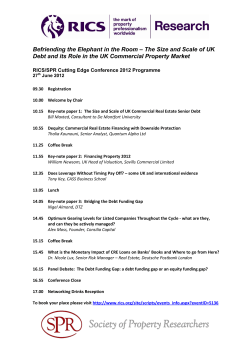
to view PDF version
? A Review of Debt Advisory in 2015 In recent years, an industry has developed around the perceived needs of company directors and individuals to receive commercial advice prior to the appointment of an administrator, liquidator or bankruptcy trustee. Such advice is sought in the expectation that it will increase the likelihood of achieving positive personal outcomes. Commonly referred to as debt advisory, pre-insolvency advisory or business advisory, the development of this industry has encroached upon an area previously the domain of solicitors, accountants and financial advisors. Insolvency professionals are now unable to provide advice in this area if they want to subsequently act in a formal capacity. This is as a result of the duties imposed upon them pursuant to the provisions of the Corporations Act 2001, the Bankruptcy Act 1966 and the Code of Professional Practice developed by the Australian Restructuring Insolvency & Turnaround Association (“ARITA”); in particular the independence requirements and the duty to act in the best interests of creditors. Debt advisors, acting as advocates for their clients, provide advice on restructuring company and personal assets with the aim of protecting them from the insolvency process. Proponents of the industry say that it maximises asset value for creditors, motivates ethical behaviour by directors and bankrupts and assists in maintaining the integrity of the insolvency industry. Critics are more inclined to believe that the industry legitimises fraudulent phoenix activity, reduces the assets which might otherwise be available for creditors, results in vulnerable people being taken advantage of and generally undermines the objectives of the insolvency profession. (For a review of what differentiates fraudulent from legitimate phoenix activity, creditors are referred to our previous newsletter entitled “Pre-Packs – Do they have a place in Australian insolvency practice?” available on our website.) CORPORATE DEBT ADVISORY Regardless of your point of view and taking into account the number of people operating in this area, the industry appears to be thriving. Unlike solicitors, accountants and financial advisors, debt advisors are unregulated and often do not have professional qualifications. At O’Brien Palmer, we have had mixed experiences working with corporate debt advisors. Forward to a Friend | opb.com.au | Unsubscribe A number of operators have been highly professional in their approach and have delivered positive outcomes for their clients. There are many debt advisors who practice in a manner which maximises asset value for the benefit of creditors, potentially retains asset value for their clients, simplifies the insolvency process and reduces costs. The same cannot be said for a number of other advisors. Some operators have spent time working in the insolvency industry and take advantage of the realities of modern insolvency administration, such as the limited scope of investigations conducted in circumstances where a liquidator is unfunded, the role played by creditors who rarely fund the activities of a liquidator or bankruptcy trustee, and the limited resources of the Australian Securities & Investments Commission (“ASIC”). Although ASIC reviews all corporate insolvency appointments in order to identify individuals advising directors to act illegally, and although insolvency practitioners have powers and duties to deal with fraudulent phoenix activity within the current legal frame work, some debt advisors lead their customers to believe that getting caught is a numbers game, and that the odds are in their favour. We have observed circumstances where directors have been; (a) advised to transfer assets for undervalue or otherwise engage in potentially fraudulent phoenix activity. (b) encouraged to destroy company books and records. (c) instructed to create security interests in an attempt to defeat creditors. (d) charged excessive fees for the services provided. (e) advised to generally engage in behaviour designed to frustrate an insolvency practitioner in the completion of his or her duties. In the event that such actions are identified as a result of a practitioners’ investigation, then the practitioner may be required to report the conduct to ASIC, or to take appropriate steps to recover assets for the benefit of creditors. PERSONAL DEBT ADVISORY Personal debt advisors can help people manage their debt levels and to avoid formal insolvency solutions such as bankruptcy. By negotiating with individual creditors and with access to alternate sources of finance, personal debt advisors can help people manage their debt levels whilst aiming to avoid formal insolvency. Importantly, they are also helping individuals free up personal capital to assist with the funding of their businesses. Where formal appointments can’t be avoided, debt advisors have assisted debtors to prepare themselves for the effects of the bankruptcy, and have assisted with the subsequent formulation of a proposal to be put to creditors in order to compromise their debts and to have their bankruptcy annulled. That said, personal debt advisors are not immune from criticism. We recently became aware of a case where a personal debt advisor claimed fees in excess of $7,000 to open a file and form the view that the only option available to his client was to declare himself bankrupt. Others have paid high fees to advisors who have done nothing more than to process hardship applications with their banks, and then received no further assistance in rectifying their personal financial situation. Unless managed carefully, the engagement of personal debt advisors may merely delay the inevitable, and can make the situation worse. SELECTING A DEBT ADVISOR Separating the sales pitch from the substance can be difficult for individuals, especially when facing extreme financial stress. In corporate matters, it is common for highly competitive debt advisors with access to the court lists to make contact with directors before they themselves are aware that an application to wind up their company has been filed, and then use high pressure tactics to ensure directors engage their services. 2 This occurs not withstanding that the debt advisors are usually unqualified to give legal advice in connection with winding up proceedings and in circumstances where engaging a lawyer will come at an additional cost to the company or its director. Choosing the right advisor is extremely difficult in such a new and unregulated industry, and the consequences of getting it wrong can be calamitous. If you are aware that a client is in contact with a debt advisor, then we recommend that you advise your client to proceed cautiously. Specifically, in assessing the services offered by debt advisors, potential clients are encouraged, wherever possible, to; CONCLUSION At O’Brien Palmer, we have worked successfully with some highly professional debt advisors. If you feel unable to advise your clients in relation to pre-insolvency matters, then we can recommend a number of operators with whom we have had successful dealings, or we can provide you with some general advice on specific insolvency related topics. We do not accept commissions for referrals, nor do we pay commissions for engagements, so you can be assured of the impartiality of our recommendation. We encourage individuals faced with financial pressure to work collaboratively with their accountants, solicitors and if appropriate, with reputable debt advisors. We also encourage such individuals to contact us at (a) seek advice from multiple sources, including O’Brien Palmer for an obligation free assessment of accountants and solicitors who are required to your circumstances and the options which remain available. act in the best interest of their clients. (b) be cautious of high pressure sales tactics and advisors who claim to be experts. (c) not be pressured into making an immediate engagement or committing on the spot. (d) be wary of promises which seem too good to be true, as they usually are. (e) enquire as to the background and qualifications of the advisor, and to ensure that the advice provided is impartial and not skewed by the benefits accruing to the advisor for work referred. (f) be realistic about the work to be completed by the advisor, as some advisors will structure a financial solution in order to maximise their fee. (g) negotiate payments which are directly related to positive outcomes. (h) avoid open ended engagements, and restrict engagements to specific tasks. (i) check all written agreements closely and carefully, and have them reviewed by a solicitor. 3 OUR SERVICES Corporate Insolvency Personal Insolvency Other Services • • • • • • • • • • • • • • • • • • • Voluntary Administration Deeds of Company Arrangement Receiverships Court Liquidation Members’ Voluntary Liquidations Creditors’ Voluntary Liquidations Provisional Liquidations Official Liquidations • Bankruptcy Part X Personal Insolvency Agreements Trustee appointments pursuant to Section 66G of the Conveyancing Act Part XI Deceased Estate Administration Business Recovery Business Viability Reviews Prelending/Refinancing Reviews Security Reviews Management Reporting Cash-Flow Management Turnaround and Growth Strategies Without obligation or cost, we are available for an initial consultation. Please contact: Chris Palmer Bryan Collis Liam Bailey Andrew Cowled cpalmer@obp.com.au bcollis@obp.com.au lbailey@obp.com.au acowled@obp.com.au SYDNEY Level 14, 9 Hunter Street, Sydney NSW 2000 | GPO Box 3385, Sydney NSW 2001 Telephone +61 2 9232 3322 | Facsimile +61 2 9232 3388 BATHURST 103 Piper Street, Bathurst NSW 2795 | PO Box 2153, Bathurst NSW 2795 Telephone +61 2 6338 2650 | Facsimile +61 2 9232 3388 This information memorandum is of necessity general in nature and its brevity could lead to misinterpretation and misunderstanding. No responsibility can be accepted for those who act on its contents without first consulting us and obtaining specific advice. Copyright © 2015 O’Brien Palmer Liability limited by a scheme approved under Professional Standards Legislation.
© Copyright 2025









